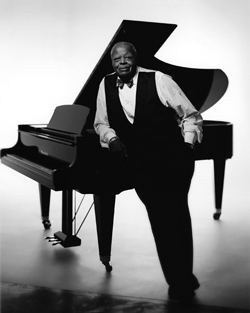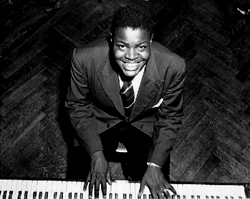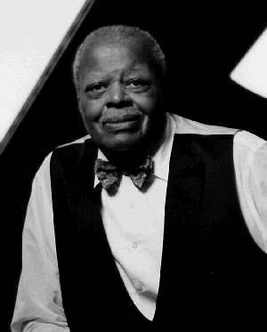By Peter Keepnews
Freddie Hubbard, a jazz trumpeter who dazzled audiences and critics alike with his virtuosity, his melodicism and his infectious energy, died Monday in Sherman Oaks, California. He was 70.
The cause was complications of a heart attack he had Nov. 26, said his spokesman, Don Lucoff of DL Media.
Over a career that began in the late 1950s, Hubbard earned both critical praise and commercial success – although rarely for the same projects.
He attracted attention in the 1960s for his bravura work as a member of the Jazz Messengers, the valuable training ground for young musicians led by the veteran drummer Art Blakey, and on albums by Herbie Hancock, Wayne Shorter and many others. He also recorded several well-regarded albums as a leader. And although he was not an avant-gardist by temperament, he participated in three of the seminal recordings of the 1960s jazz avant-garde: Ornette Coleman’s “Free Jazz” (1960), Eric Dolphy’s “Out to Lunch” (1964) and John Coltrane’s “Ascension” (1965).
In the 1970s Hubbard, like many other jazz musicians of his generation, began courting a larger audience, with albums that featured electric instruments, rock and funk rhythms, string arrangements and repertory sprinkled with pop and R&B songs like Paul McCartney’s “Uncle Albert/Admiral Halsey” and the Stylistics’ “Betcha by Golly, Wow.” His audience did indeed grow, but his standing in the jazz world diminished.
By the start of the next decade he had largely abandoned his more commercial approach and returned to his jazz roots. But his career came to a virtual halt in 1992 when he damaged his lip, and although he resumed performing and recording after an extended hiatus, he was never again as powerful a player as he had been in his prime.
Frederick Dewayne Hubbard was born on April 7, 1938, in Indianapolis. His first instrument was the alto-brass mellophone, and in high school he studied French horn and tuba as well as trumpet.
After taking lessons with Max Woodbury, the first trumpeter of the Indianapolis Symphony Orchestra, at the Arthur Jordan Conservatory of Music, he performed locally with, among others, the guitarist Wes Montgomery and his brothers.
Hubbard moved to New York in 1958 and almost immediately began working with groups led by the saxophonist Sonny Rollins, the drummer Philly Joe Jones and others. His profile rose in 1960 when he joined the roster of Blue Note, a leading jazz label; it rose further the next year when he was hired by Blakey, widely regarded as the music’s premier talent scout.
Adding his own spin to a style informed by Dizzy Gillespie, Miles Davis and Clifford Brown, Hubbard played trumpet with an unusual mix of melodic inventiveness and technical razzle-dazzle. The critics took notice. Leonard Feather called him “one of the most skilled, original and forceful trumpeters of the ’60s.”
After leaving Blakey’s band in 1964, Hubbard worked for a while with another drummer-bandleader, Max Roach, before forming his own group in 1966. Four years later he began recording for CTI, a record company that would soon become known for its aggressive efforts to market jazz musicians beyond the confines of the jazz audience.
Hubbard won a Grammy Award for the album “First Light” in 1972 and was named a National Endowment for the Arts Jazz Master in 2006.
He is survived by his wife of 35 years, Briggie Hubbard, and his son, Duane.
Hubbard was once known as the brashest of jazzmen, but his personality as well as his music mellowed in the wake of his lip problems. In a 1995 interview with Fred Shuster of Down Beat, Hubbard offered some sober advice to younger musicians: “Don’t make the mistake I made of not taking care of myself. Please, keep your chops cool and don’t overblow.”
Click here to view obituary.
Click here to view bio.
Click here to view discography.
Check out a couple YouTube clips below:
http://www.youtube.com/watch?


 Oscar Peterson was a Canadian jazz pianist and composer. He was called the “Maharaja of the keyboard” by Duke Ellington, “O.P.” by his friends, and was a member of jazz royalty. He released over 200 recordings, won seven Grammy Awards, and received other numerous awards and honors over the course of his career. He is considered to have been one of the greatest pianists of all time, who played thousands of live concerts to audiences worldwide in a career lasting more than 65 years. Oscar Peterson has entertained the world with his mastery and prowess over the piano for over 40 years. Born in a limestone house on Montreal’s Delisle Street on August 15, 1925, he was the fourth of five children to his parents, Daniel and Kathleen. All of the Peterson children (Fred, Daisy, Charles, Oscar and May) were introduced to music in a good way before any of them can remember. Their father, a porter with Canadian Pacific Railways who learned to play piano on his own while in the merchant marine, taught his children all he could until they achieved a certain proficiency. It was at this point, during his high school years, that Oscar came to study with an accomplished classical pianist, Hungarian Paul de Marky, who taught Oscar “technique and speedy fingers.” He also helped Oscar come to believe that he had something special to give to the music world.
Oscar Peterson was a Canadian jazz pianist and composer. He was called the “Maharaja of the keyboard” by Duke Ellington, “O.P.” by his friends, and was a member of jazz royalty. He released over 200 recordings, won seven Grammy Awards, and received other numerous awards and honors over the course of his career. He is considered to have been one of the greatest pianists of all time, who played thousands of live concerts to audiences worldwide in a career lasting more than 65 years. Oscar Peterson has entertained the world with his mastery and prowess over the piano for over 40 years. Born in a limestone house on Montreal’s Delisle Street on August 15, 1925, he was the fourth of five children to his parents, Daniel and Kathleen. All of the Peterson children (Fred, Daisy, Charles, Oscar and May) were introduced to music in a good way before any of them can remember. Their father, a porter with Canadian Pacific Railways who learned to play piano on his own while in the merchant marine, taught his children all he could until they achieved a certain proficiency. It was at this point, during his high school years, that Oscar came to study with an accomplished classical pianist, Hungarian Paul de Marky, who taught Oscar “technique and speedy fingers.” He also helped Oscar come to believe that he had something special to give to the music world. trumpeter Maynard Ferguson. He got permission to play the baby grand piano during the lunch hours and in his words this was “the best way to have a bunch of girls come down. I became the guy.” At 14 years of age, Oscar’s older sister Daisy got him to audition for a CBC (Canadian Broadcasting Corporation) national amateur contest which he went on to win. This opened the doors to performances on a weekly broadcast show, on a Montreal radio station, called Fifteen Minutes’ Piano Rambling and later performances on a national CBC broadcast called The Happy Gang. Finally, when algebra couldn’t banish musical arrangements, Oscar asked to drop out of high school. His father told him that he couldn’t “let him leave high school to be a jazz piano player. You have to be the best, there is no second best.”
trumpeter Maynard Ferguson. He got permission to play the baby grand piano during the lunch hours and in his words this was “the best way to have a bunch of girls come down. I became the guy.” At 14 years of age, Oscar’s older sister Daisy got him to audition for a CBC (Canadian Broadcasting Corporation) national amateur contest which he went on to win. This opened the doors to performances on a weekly broadcast show, on a Montreal radio station, called Fifteen Minutes’ Piano Rambling and later performances on a national CBC broadcast called The Happy Gang. Finally, when algebra couldn’t banish musical arrangements, Oscar asked to drop out of high school. His father told him that he couldn’t “let him leave high school to be a jazz piano player. You have to be the best, there is no second best.”
